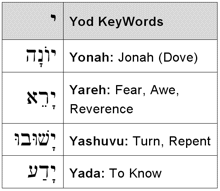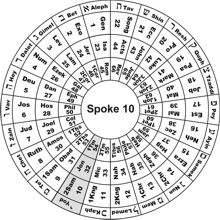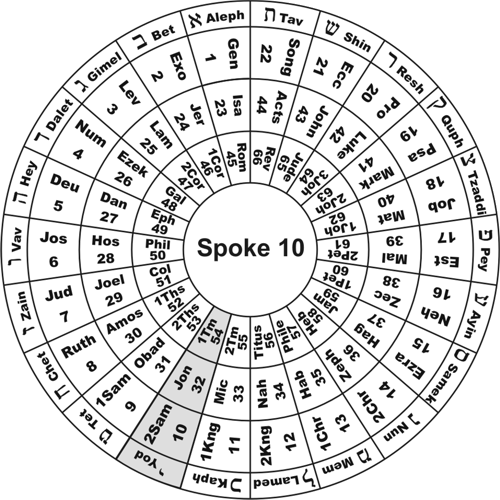Preaching the Fear of the Lord
And they said every one to his fellow, Come, and let us cast lots, that we may know for whose cause this evil is upon us. So they cast lots, and the lot fell upon Jonah. Then said they unto him, Tell us, we pray thee, for whose cause this evil is upon us; What is thine occupa-tion? and whence comest thou? what is thy country? and of what people art thou? And he said unto them, I am an Hebrew; and I fear the LORD, the God of heaven, which hath made the sea and the dry land.
Jonah 1:7ff (Spoke 10, Cycle 2)
 God
revealed the essential theme of Jonah in five interwoven Alphabetic Verses corresponding to Yod: God
revealed the essential theme of Jonah in five interwoven Alphabetic Verses corresponding to Yod:
- AV Psalm 34:9 O fear (yareh) the LORD, ye his saints: for there is no want to them that fear him.
- AV Psalm 119:74 They that fear (yareh) thee will be glad when they see me; because I have hoped in thy word.
- AV Psalm 119:75 I know (yada), O LORD, that thy judgments are right, and that thou in faithfulness hast afflicted me.
- AV Psalm 37:18 The LORD knoweth (yada) the days of the upright: and their inheritance shall be for ever.
- AV Psalm 119:79 Let those that fear (yareh) thee turn (yashuvu) unto me, and those that have known thy testimonies.
In Hebrew, this last verse begins with the primary KeyWord yashuvu, followed by yareh
as the secondary KeyWord. It figures prominently in the repentance of Nineveh.
The story begins when Jonah fled "the presence of God" on a ship to Tarshish. God raised up a storm to cause
great fear in the men of the ship who then cast lots and found Jonah to be guilty
before God. This introduces the second reference to the "fear of the Lord":
Wherefore they cried unto the LORD, and said, We beseech thee,
O LORD, we beseech thee, let us not perish for this manís life, and lay not upon us innocent blood: for
thou, O LORD, hast done as it pleased thee. So they took up Jonah, and cast him forth into the sea:
and the sea ceased from her raging. Then the men feared (yareh) the LORD exceedingly,
and offered a sacrifice unto the LORD, and made vows.
Jonah 1:14ff (Spoke 10, Cycle 2)
When the fear of the storm first fell on the men of the ship, everyone "cried unto his god,"
but after speaking with Jonah, they turned and sacrificed to the Lord, the True God, and feared Him exceedingly.
The Lord Jesus declared that Jonah was a sign of His Death and Resurrection.
The typology here is truly astounding. Jonah willingly went to his "death" in the sea just as Christ
willingly went to the Cross. And just as God preserved Christ from "corruption" (Acts 2:27 quoting Psalm 16:10),
so Jonah declared "thou brought up my life from corruption, O LORD my God" (Jonah 2:6),
using exactly the same word as the prophetic Psalm 16:10. And just as the preaching of Christ's
death and resurrection has brought forth a great company of people who have "believed God," so also a multitude
turned to believe the True God at the preaching of Jonah:
And the word of the LORD came unto Jonah the second time, saying, Arise, go unto Nineveh,
that great city, and preach unto it the preaching that I bid thee. So Jonah arose, and went unto Nineveh,
according to the word of the LORD. Now Nineveh was an exceeding great city of three daysí journey. And Jonah
began to enter into the city a dayís journey, and he cried, and said, Yet forty days, and Nineveh shall
be overthrown. So the people of Nineveh believed God, and proclaimed a fast, and put on
sackcloth, from the greatest of them even to the least of them. For word came unto the king of Nineveh,
and he arose from his throne, and he laid his robe from him, and covered him with sackcloth,
and sat in ashes. And he caused it to be proclaimed and published through Nineveh by the decree of
the king and his nobles, saying, Let neither man nor beast, herd nor flock, taste any thing:
let them not feed, nor drink water: But let man and beast be covered with sackcloth, and
cry mightily unto God: yea, let them turn (yashuvu) every one from his evil way,
and from the violence that is in their hands. Who can know (yada) if God will
turn and repent, and turn away from his fierce anger, that we perish not? And God saw their
works, that they turned from their evil way; and God repented of the evil, that he had said that
he would do unto them; and he did it not.
Jonah 3:1ff (Spoke 10, Cycle 2)
The four highlighted words translated as turn are based on the Shin KeyWord shuv.
Its first occurrence, translated as "let them turn," is written with the Yod Prefix to form
the "third person imperfect" conjugation, which is the exact form that God Himself presented in the
Alphabetic Verse quoted above (AV Ps 119:79).
|



